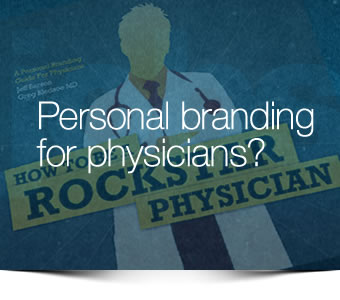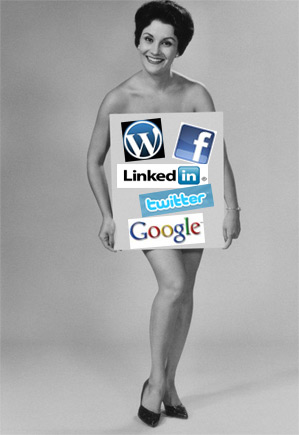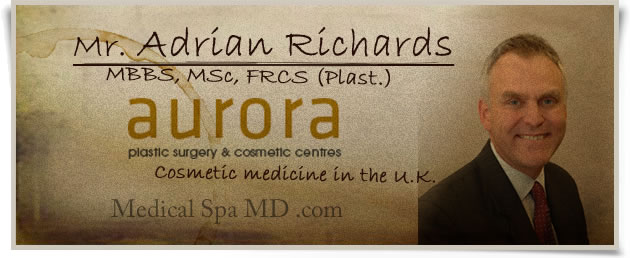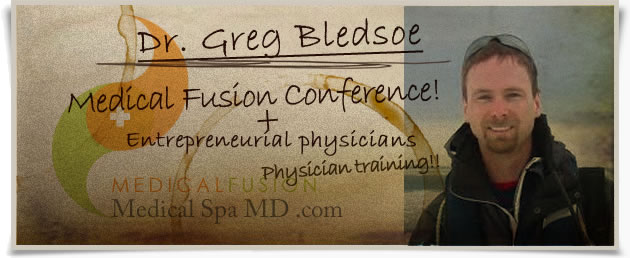Here's some very good advice from one of our Select Partners, Medical Justice.
The observation that social media is experiencing explosive growth is hardly novel. Moreover, social media is significantly influencing the medical profession. CNN Money.com reported that Facebook passed the milestone of half a billion signed on users half a year into 2010. The professional and legal ramifications from the rapid growth of social media touch almost every aspect of physicians practicing today. One of the most challenging of these ramifications is a physician’s online reputation.
Pew Internet and American Life Project recently released numbers that document just how important of the source of information regarding medicine and physicians the internet has become. Sixty-one percent (61%) of American adults look on-line for health information. Forty-nine percent (49%) of Internet users report researching a specific disease or medical problem on the Internet. Forty-seven percent (47%) report seeking information about their physician or other healthcare professionals from on-line sources.
Finally, five percent (5%) of “E-Patients” have posted a review online of a doctor. It is these very reviews from a small subset which form the basis of a physician’s reputation on-line.
Reputations are forged when people make judgments upon the mosaic of information available about us.” Viewed in this light, ratings, blog postings, and web pages are the pieces of the reputation mosaic. Unfortunately, all it takes is one or two bad pieces for the mosaic to be marred. The implications of a damaged online reputation are extensive."
Most physicians equate a tainted online reputation with a direct loss of business. The analysis is simple; the worse the online reputation, the fewer the patients. There are certainly many examples to support this reasoning.
Dr. Linda Morrison, a physician practicing in Indiana, experienced first hand the harm that arises from an online reputational attack. In July of 2000, Dr. Morrison noticed that an anonymous individual was posting defamatory statements about her via the internet. Dr. Morrison received e-mails from this individual under a pseudonym “Surfycity45” that, among other things, made threats against her medical license. The attacks continued into the fall of 2000. Dr. Morrison ultimately learned that “Surfycity45” had been circulating defamatory comments about her while simultaneously encouraging others to do the same. “Surfycity45” worked hard to organize a cyber mob with Dr. Morrison as its target.
Dr. Morrison, via counsel, attempted to enjoin Defendant American Online, Inc. from the continued posting of the defamatory statements about her by the anonymous subscriber. For a variety of legal reasons, the United States Northern District Court of Indiana ruled against the injunction. Although Dr. Morrison alleged that “Surfycity45” statements were false, defamatory, and had resulted in damage to her professional reputation as a physician, she was unable to have these remarks removed from the Internet in a timely fashion. The damage was done.
The implications of a physician's online reputation now extends beyond patients. At least twenty seven (27) states have a recognized cause of action for negligently credentialing a physician. Given this liability, credentialing committees will likely perform detailed background checks using all available search tools, including social network sites.
Health institutions making credentialing or hiring decisions currently face a dilemma when it comes to information about physicians contained in social network profiles. Although there may be some risks in searching against them (as discussed in the next section), the potential liability for making a panel decision in the absence of such information likely tips the balance."
It is not just patients and credentialing committees which are scrutinizing physicians’ online reputations. In any medical malpractice action, physicians should assume that the plaintiff’s attorney will checking the doctor’s online reputation. Geoffrey Vance, a thirty eight (38) year old partner at McDermott, Will and Emry, makes use of social networking sites to gather facts about the opposing side for trials. “I make it a practice to use as many sources as I can to come up with and to find information about the other side” Vance said. “We used to run Lexus Nexus; we still do that. We always look at cases, and now we use the internet – Google, and social networking sites.”
Mr. Vance is not alone. Paul Kiesel, a lawyer in Los Angeles County, admits to using social media not only to investigate the opposing side, but also to help select jurors. “Last month I had fifty (50) jurors, and as the Court Clerk read out the names, I had two (2) people in the courtroom and the third person back at the office, with all three (3) of them doing research.”
Lawyers are not the only actors in a courtroom who are using social media at trial. Courts across the country are grappling with the serious problem of “Internet-tainted” jurors. In case after case, judges and lawyers have discovered that jurors are doing independent research via cell phone during trials. Last year in Arkansas, a state court judge allowed a 12.6 million dollar verdict to stand even though a juror sent eight (8) messages via Twitter from his cell phone.
In another case, a juror decided to seek the wisdom of the masses by holding a Facebook online poll. “I don’t know which way to go, so I’m holding a poll, wrote the democratic juror.” Upon learning of this misadventure, the juror was dismissed and the case proceeded.
Physicians’ online reputations are being examined with increasing frequency at crucial moments in their professional career. It is no longerprudent for a physician to fail to monitor his or her online reputation. “Physicians should carefully monitor their online reputation. I have seen examples of ex-spouses, past employees, and competitors all posing as disgruntled patients in an online effort to damage a physician’s reputation. This is a real threat that is not going away,” says Rivera.
In the words of Benjamin Franklin “It takes many good deeds to build a good reputation, and only one bad one to lose it.”
Resource: Physicians + Facebook Marketing - How to do it correctly!
Guest post by Joy Tu of Medical Justice.
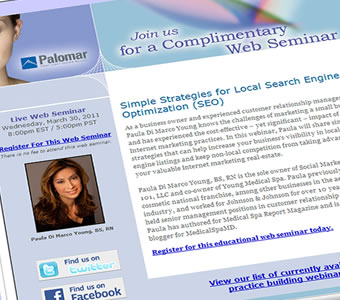 Paula Di Marco Young is hosting a local SEO webinar for Palomar.
Paula Di Marco Young is hosting a local SEO webinar for Palomar.
